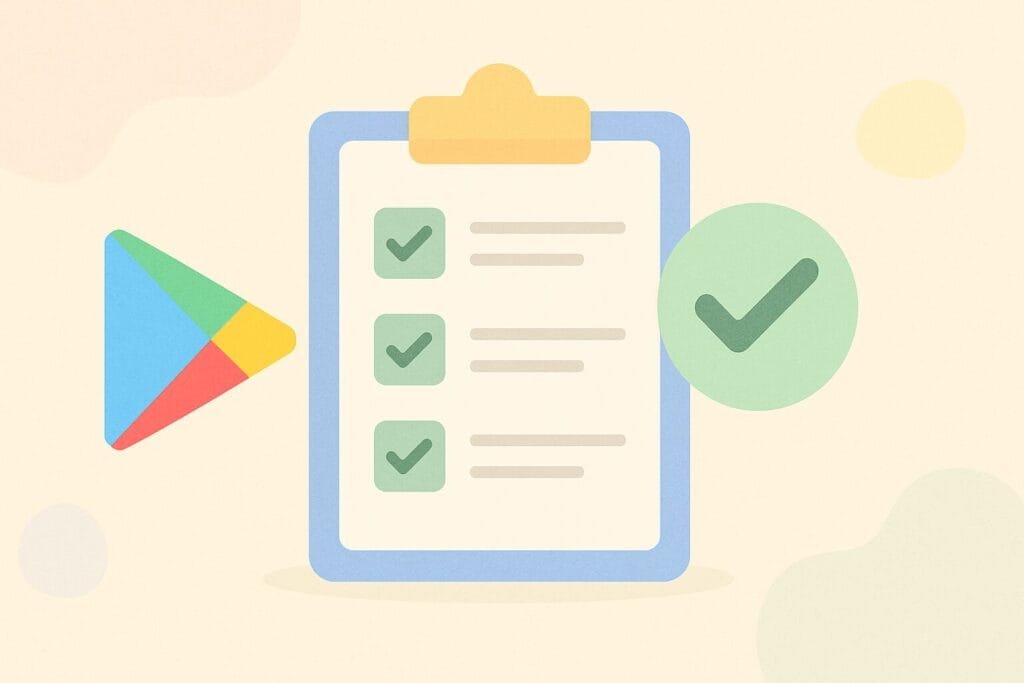Publishing an app on the Google Play Store can be exciting, but getting it approved through the Google Play Console review process can sometimes be challenging. Whether you’re a first-time developer or a seasoned app creator, it’s essential to understand what Google expects before your app goes live.

In this article, we’ll share practical tips to pass the Google Play Console review, reduce the chances of rejection, and ensure your app is compliant with Google’s strict policies.
1. Understand Google’s Developer Policies
Before you even upload your APK or AAB file, make sure you thoroughly read and understand the Google Play Developer Policy Center. This includes rules regarding content, user data, ad behavior, subscriptions, permissions, and more.
Violating any of these policies can lead to an app rejection or even a developer account suspension.
2. Prepare a Complete App Listing
An incomplete or misleading store listing is a common reason for review failure. Ensure your listing includes:
- Accurate app title, short description, and full description
- At least 2-3 high-quality screenshots
- A feature graphic and app icon that reflect the app’s function
- Properly categorized app type and age rating
- A clear privacy policy URL
Your descriptions must not include claims that cannot be verified, misleading information, or content that promotes illegal activity.
3. Provide a Valid Privacy Policy
Even if your app doesn’t handle sensitive user data, Google now requires a privacy policy for almost all apps. The privacy policy should clearly explain:
- What data is collected
- How it is used
- Whether it is shared with third parties
- How users can request data deletion
Make sure the URL is live and links to a well-written page hosted on your own website or a reputable platform.
4. Minimize Permissions and Explain Them Clearly
Only request permissions that are essential for your app to function. For example, if your app doesn’t need access to the device’s location or camera, don’t request it. If you do need these permissions, explain clearly in your app (with UI prompts) and in the store listing why they’re required.
Unnecessary permissions can trigger privacy concerns and cause app rejection.
5. Avoid Copyright Violations
Google is strict about copyright infringement. Ensure all images, logos, sounds, and content used in your app are either original, licensed, or under fair use. If you’re using third-party APIs, ensure they are used in accordance with their respective licenses.
Do not use brand names, logos, or other trademarks you don’t own in your app title or description.
6. Test Your App Thoroughly
A buggy app that crashes or has broken functionality will not pass review. Use multiple test devices and emulators to verify:
- No crashes on startup
- All features are working as intended
- There are no ANRs (Application Not Responding) issues
- UI/UX is optimized for different screen sizes and Android versions
Google may test your app manually during the review, so ensure a smooth first-run experience.
7. Use a Closed Test Track First
If you’re unsure whether your app will pass the review or want feedback before a public release, use the internal testing or closed testing tracks. These allow you to share your app with testers and collect feedback without risking public reviews or visibility issues.
8. Don’t Rush the Review Process
After submission, the review process can take anywhere from a few hours to several days. Avoid repeatedly submitting new versions unless necessary. Each submission resets the review queue, which can cause delays.
Be patient and make sure your app version is final before publishing.
9. Include a Clear Login Method (If Required)
If your app requires login, provide test credentials in the Play Console’s App Access section. Failing to do this can result in automatic rejection as the reviewer won’t be able to test your app’s core functionality.
10. Follow Android Guidelines for Ads and Monetization
If your app displays ads, ensure the ad placements comply with Google’s Ad Policy. Ads should not be intrusive, misleading, or interfere with the app’s core usage. Rewarded ads must be optional and clearly labeled.
Conclusion
By taking the time to prepare your app properly, following Google’s guidelines, and testing thoroughly, you can significantly increase your chances of passing the Google Play Console review on the first try.
If you want to explore more about Google Play policies and app publishing best practices, check out this external guide: Google’s Developer Policy Center

